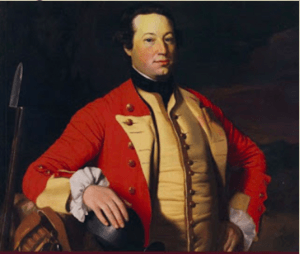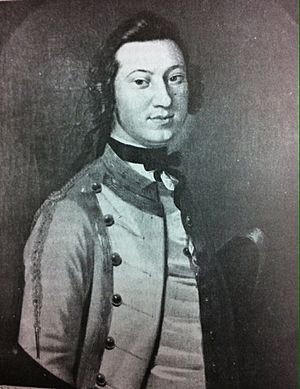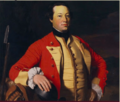George Scott (British Army officer) facts for kids
Quick facts for kids
George Scott
|
|
|---|---|

Captain George Scott by John Singleton Copley (c.1758), The Brook
|
|
| Died | 6 November 1767 |
| Allegiance | |
| Service/ |
|
| Rank | Major |
| Unit | 40th Regiment of Foot |
| Commands held | Fort Lawrence |
| Battles/wars | Battle of Fort Beauséjour; Siege of Louisbourg; Battle of the Plains of Abraham |
George Scott (died 1767) was a British army officer. He served in Acadia, which is now mostly Nova Scotia and parts of New Brunswick, Canada. He fought in two important conflicts: Father Le Loutre's War and the French and Indian War.
Contents
Starting His Military Career
George Scott began his army career in 1746. He joined the 40th Regiment of Foot. By 1751, he had become a captain.
In 1753, he took charge of Fort Lawrence. While there, he met Thomas Pichon. Pichon was a French agent who secretly gave information to the British. Scott left his command at Fort Lawrence in late 1754.
The Attack on Fort Beauséjour
Scott then helped prepare for an attack on Fort Beauséjour. He was chosen to lead one of two groups of soldiers. These troops were from Massachusetts. He played a big part in the short siege of the fort.
After the fort was captured, Lieutenant-General Robert Monckton left the area. Scott was put in charge of the Chignecto region.
Fighting in Major Wars
Scott was known for leading "light troops." These soldiers used quick, flexible fighting methods. He was part of Major General Peregrine Hopson's 40th Regiment. He was good at using less traditional battle tactics.
In May 1758, orders stated that Scott would command the "rangers and light infantry." These were special units. He fought bravely during the Siege of Louisbourg (1758). Later, he served with Major General James Wolfe at the Battle of the Plains of Abraham.
Scott also took part in campaigns against the Acadians. These included the Petitcodiac River Campaign and the St. John River Campaign.
Later Life and Death
Scott was promoted to the rank of major on December 28, 1758. He remained listed as a captain in the 40th Foot. He was still considered a company commander until his death.
Robert Monckton later appointed Scott as the Governor of Grenada. Scott wrote his will in Grenada in December 1764. Soon after, he left to become the acting Governor of Dominica.
George Scott died on November 6, 1767. He was fatally injured in a duel. In his will, he left his property to his wife Abigail and his father. He also left property to his three brothers and three sisters. One of his brothers, Joseph Scott, lived in Halifax. Joseph lived at Scott Manor House near Fort Sackville.
See also
Images for kids
 | Madam C. J. Walker |
 | Janet Emerson Bashen |
 | Annie Turnbo Malone |
 | Maggie L. Walker |




